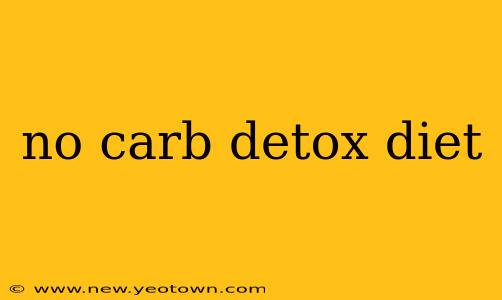The idea of a "detox" is alluring. We envision a shedding of toxins, a revitalization of our bodies, a fresh start. But is a no-carb detox diet the magic bullet many believe it to be? The truth is more nuanced than a simple yes or no. Let's embark on a journey to understand what a no-carb detox truly entails, its potential benefits, drawbacks, and the crucial considerations before embarking on such a restrictive diet.
What Exactly is a No-Carb Detox Diet?
Imagine a diet that drastically cuts out carbohydrates – bread, pasta, rice, sugary drinks, even many fruits and vegetables. That's the essence of a no-carb detox diet. The premise is that by eliminating carbs, your body will be forced to burn stored fat for energy, leading to weight loss and a purported "cleansing" effect. Proponents often suggest that this process helps rid the body of toxins, improves energy levels, and boosts overall health. However, it's crucial to understand that this is a highly restrictive approach and should be undertaken with caution and ideally under the guidance of a healthcare professional.
Does a No-Carb Detox Actually Detoxify Your Body?
This is where things get interesting. Our bodies have natural detoxification systems – the liver and kidneys – that work tirelessly to filter out waste. While a no-carb diet might lead to some initial weight loss due to water loss and glycogen depletion (glycogen is stored carbohydrate), there's limited scientific evidence to support the idea that it significantly enhances the body's natural detoxification processes. The "detox" benefits are largely perceived rather than scientifically proven.
What are the Potential Benefits of a No-Carb Detox?
While the detox claims are debatable, there are some potential benefits associated with reducing carbohydrate intake, particularly in the short term:
- Weight Loss: A significant reduction in carbohydrates can lead to a decrease in water weight and, potentially, fat loss due to the body's shift to burning fat for energy. However, this weight loss may not be sustainable long-term.
- Improved Blood Sugar Control: For individuals with insulin resistance or prediabetes, temporarily reducing carbohydrate intake can help improve blood sugar levels. However, this needs to be done under medical supervision.
- Reduced Inflammation (Potentially): Some studies suggest that low-carbohydrate diets may reduce inflammation in certain individuals. More research is needed to confirm this.
It's vital to remember these benefits are often temporary and may not apply to everyone.
What are the Potential Risks and Side Effects of a No-Carb Detox?
The restrictive nature of a no-carb detox diet presents several potential risks:
- Nutrient Deficiencies: Eliminating entire food groups, especially fruits and vegetables, can lead to deficiencies in essential vitamins and minerals.
- Fatigue and Weakness: The body needs carbohydrates for energy. A drastic reduction can cause fatigue, weakness, and difficulty concentrating.
- Constipation: Low fiber intake, common in no-carb diets, can lead to constipation.
- Headaches and Dizziness: These are common side effects of sudden carbohydrate restriction.
- Muscle Loss: Without sufficient carbohydrates, the body can start breaking down muscle tissue for energy.
- Nutrient Imbalance: The body requires a wide range of vitamins and minerals from a balanced diet. A highly restricted diet is likely to cause a severe deficiency, negatively impacting overall health.
- Metabolic Disruption: Extremely low-carb diets might affect metabolism and hormone regulation in the long run.
How Long Should You Do a No-Carb Detox?
There's no universally agreed-upon duration. However, due to the potential risks, it's generally not recommended to follow a strict no-carb detox for extended periods. A short-term approach, potentially under medical supervision, might be considered for specific purposes, such as managing blood sugar, but even then, a balanced and gradual approach is crucial.
What are the Best Foods to Eat During a No-Carb Detox?
This is highly dependent on the specific approach, but generally, a no-carb detox focuses on high-fat, high-protein foods such as:
- Meats: Chicken, beef, fish, etc.
- Eggs: A good source of protein.
- Fatty Fish: Rich in Omega-3 fatty acids.
- Nuts and Seeds: Provide healthy fats and some fiber.
- Non-Starchy Vegetables: Leafy greens, broccoli, cauliflower, etc. (though some versions restrict these too).
- Healthy Fats: Avocado, olive oil, coconut oil.
Is a No-Carb Detox Diet Right for Me?
A no-carb detox diet is not a one-size-fits-all solution. Before embarking on such a restrictive approach, consulting a healthcare professional or registered dietitian is paramount. They can assess your individual needs and health status and advise on whether this type of diet is suitable for you and how to mitigate potential risks. Remember, sustainable lifestyle changes are far more beneficial than extreme, short-term fixes. Prioritizing a balanced, whole-foods diet, regular exercise, and stress management will ultimately contribute to better overall health and well-being.

